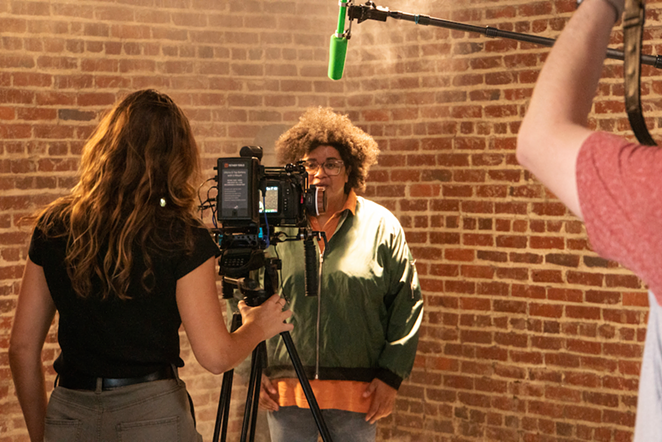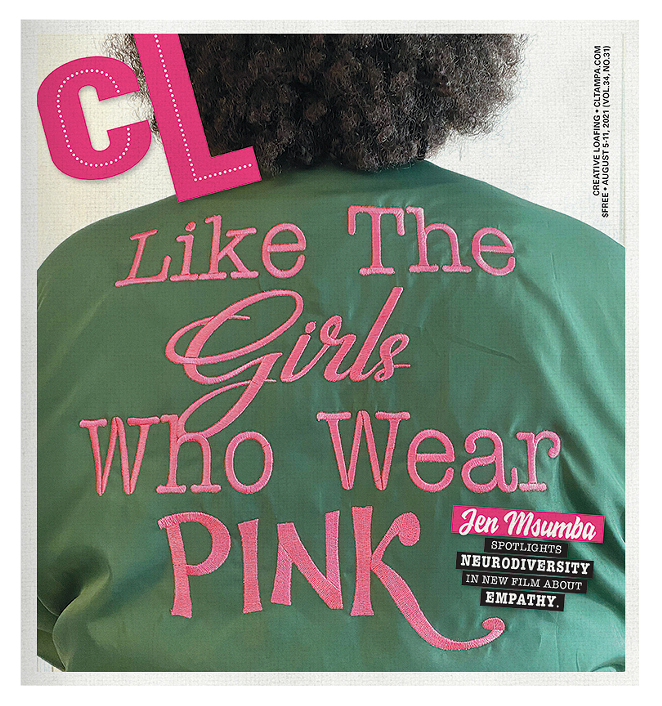
Empathy is in short supply on the playground, but local artist Jennifer Msumba hopes to change that.
Msumba came into this world with a double-dose of otherness. As an autistic person of color, she’s suffered her share of playground bullies.
“This was back in the times when [bullying] was a lot more tolerated,” Msumba told CL. “There weren't all these things in place to protect kids... It was just one of those things you had to deal with back then. Even now, there's a lot more awareness of bullying, [but] it still goes on.”
How do we stop schoolyard bullying once and for all? There’s no easy solution, but Msumba has a plan.
“I think if we can make people aware of why people are different, and what might be going on behind the scenes, it might help them be more empathetic towards people who are different from them,” says Msumba. “If they could see the loneliness, if they could see the reasons why someone might be different, maybe that would help them put themselves in [someone else’s] shoes for a change."
That isolation and loneliness is the main reason Msumba started posting music videos on YouTube in 2013.
“When I started YouTube, I was very inside of programs. I hadn't been out in the world, so it was my way of engaging with the world,” says Msumba. “I had been locked up for so long, YouTube was my only way to engage.”
After she’d been posting music for a while, her viewers requested she talk more, so in 2017 she started a vlog where she speaks about life with autism. The vlog now has over 32,000 subscribers.
The more Msumba shared her life experiences on YouTube, the more people reached out to tell her how much they were learning from her YouTube channel.
“That’s when I realized I was having an impact,” Msumba told CL.
Through these interactions, Msumba zeroed in on where she could make the most impact—writing and directing short films that promote tolerance and understanding of people who are different from us.
She studied YouTube videos and read books on filmmaking until she learned what she needed to know to write and direct her first short film, “The Dayroom,” in 2019. In it, a young man uses his creativity and imagination to escape the monotony of life in an adolescent psychiatric unit.
That same year, she filmed “The Next Shift” in Tampa. In this 12-minute-long documentary, Msumba interviews participants in Autism Shifts, a Bay area program that helps people with autism find work. It premiered at the 14th Annual Sunscreen Film Festival in 2019.
Her big break came in 2020 when she entered Nic Novicki’s Easterseals Disability Film Challenge. The topic was documentary.
“You basically don't know the topic until it's time for the challenge,” said Msumba, “and then you have five days to complete the entire film, edit, everything.”
Msumba said the constraints forced her to get even more creative. In “The Fish Don’t Care When It Rains,” Msumba turned the camera on herself, speaking about her own struggles with autism and self-harm, and how she used creativity to get better. It won Best Film at Easterseals before going on to win the Best Short Documentary award at the 16th Annual Sunscreen Film Festival in 2021.
I discovered Jennifer Msumba’s work in an email from St. Pete Clearwater Film Commissioner Tony Armer promoting Msumba’s latest film project, “Like the Girls Who Wear Pink.”
"When I was a little girl, all the girls would wear pink shirts and pants and little shoes and things,” Msumba told CL. “I didn't want to wear pink. It was just something that I was against. I felt like all the girls were wearing it, [and] I was a tomboy…I didn't feel right wearing pink. But I noticed that the girls who did wear pink, that followed the rules all the time, that had a certain way about them, the teachers favored them, the teachers would always call on them. They got awards all the time for best behaved, best this, and best that. And I was a very smart kid—I got very good grades, but they never gave me awards. I just wanted one darn certificate.”
While creating “Like the Girls Who Wear Pink,” Msumba wondered what life would’ve been like if she had just worn pink and acted like everyone else.
“I was always a little bit against the grain with everything," says Msumba, who hopes this film will open people’s eyes to others’ struggles.
“The goal of the film,” she said, “is to convey that there are so many neurodiverse individuals who are having internal struggles that others can't imagine. The film will impact people into having a change of heart about that kid they may have teased growing up, and to open their eyes as to what that kid may have been going through. Not to shame them, but to help them be better allies today. I want to encourage others to help support, give hope and chances to autistic people and people with disabilities in general”.
Msumba first pitched “Like the Girls Who Wear Pink” to Armer at last year’s Sunscreen Film Festival in St. Pete.
“When it came time for that pitch fest on the last day of the festival, Armer was one of the producers that were up there who we were pitching to,” Msumba told CL. “The funny part is that it's only supposed to be an educational exercise. Like, they preface it, 'It's not a real pitch fest. It's just to get feedback on your pitch and on your film idea.’ But I don't know, Tony just liked it and he actually took my pitch."
Armer liked it so much, he recruited sponsors and a crew to support the venture.
Msumba, who’s used to filming everything herself with the help of a tripod and a few friends, says “Like the Girls Who Wear Pink” is now bigger than she could have ever imagined.
On the first day of filming, over a dozen people worked side by side, tucked in a far corner of the Morean Center for Clay in St. Pete’s Warehouse Arts District.
One crew member held a fog machine, while others set up lights, hoisted a boom mic overhead, and manned the cameras. Msumba stepped out of the fog to deliver her first lines. And I’d tell you what they are, but I don’t want to ruin the surprise. I will say this: the opening has me looking forward to seeing the rest of the film when it comes out.
Msumba and crew finished filming and editing “Like the Girls Who Wear Pink” during the month I worked on this feature. It’s currently in audio and color correction. Once completed, Msumba plans to submit her short film to man, and the New Orleans Film Festival.
“I want to try some of the big festivals and see what happens,” Msumba told CL. “You don’t know if you don’t try.”
In one form or the other, Msumba’s been telling her story since 2017, and each time the telling gets better. That’s the beauty in an artist’s evolution. Once exclusively a musician, Msumba’s expanded her creative expression to include writing and filmmaking in 2019, and it’s finally all coming together for her.
“A lot of my films are based on songs I’ve written and vice versa,” Msumba told CL. She wrote “Like the Girls Who Wear Pink” based on her song “Finally Home.” Then, filming “Like the Girls Who Wear Pink” inspired a new song, “Girl You’re Gonna Fly,” now on Spotify and YouTube.
This year, Msumba started writing for The Musical Autist and is currently writing and editing her memoir/guide to autism, “Shouting at Leaves,” which she plans to self-publish later this year.
Hard road
Msumba’s journey to creativity wasn’t easy. She remembers being creative as a kid before undergoing a series of autism and mental health treatments and programs. These programs were supposed to make her feel better. Instead, they made her feel worse. Some of the so-called treatments Msumba received, like the shock “therapy” she endured at the Judge Rotenberg Center in Canton, Massachusetts, were abusive and should never have happened.
“My creativity just got squashed,” Msumba told CL. “With all the medication and depression, I lost my creativity; I lost my musical interest; it was all just gone.”
Thankfully, once she found proper treatment and a better living situation, all that creativity came back.
“I found my love for music first again,” says Msumba. “I got a little piano and I was playing that. And then I started doing YouTube, and that got me interested in filmmaking, which in turn got me interested in writing, and it all just snowballed, and I found all these things I love to do and create again.”
Msumba’s story serves as an important reminder that creativity is a fragile thing. It’s easy to fall or be shoved off the path, but with strength, support and perseverance, you can come back. And what a beautiful comeback this is.
Support local journalism in these crazy days. Our small but mighty team works tirelessly to bring you news on how coronavirus is affecting Tampa and surrounding areas. Please consider making a one time or monthly donation to help support our staff. Every little bit helps.
Subscribe to our newsletter and follow @cl_tampabay on Twitter.


